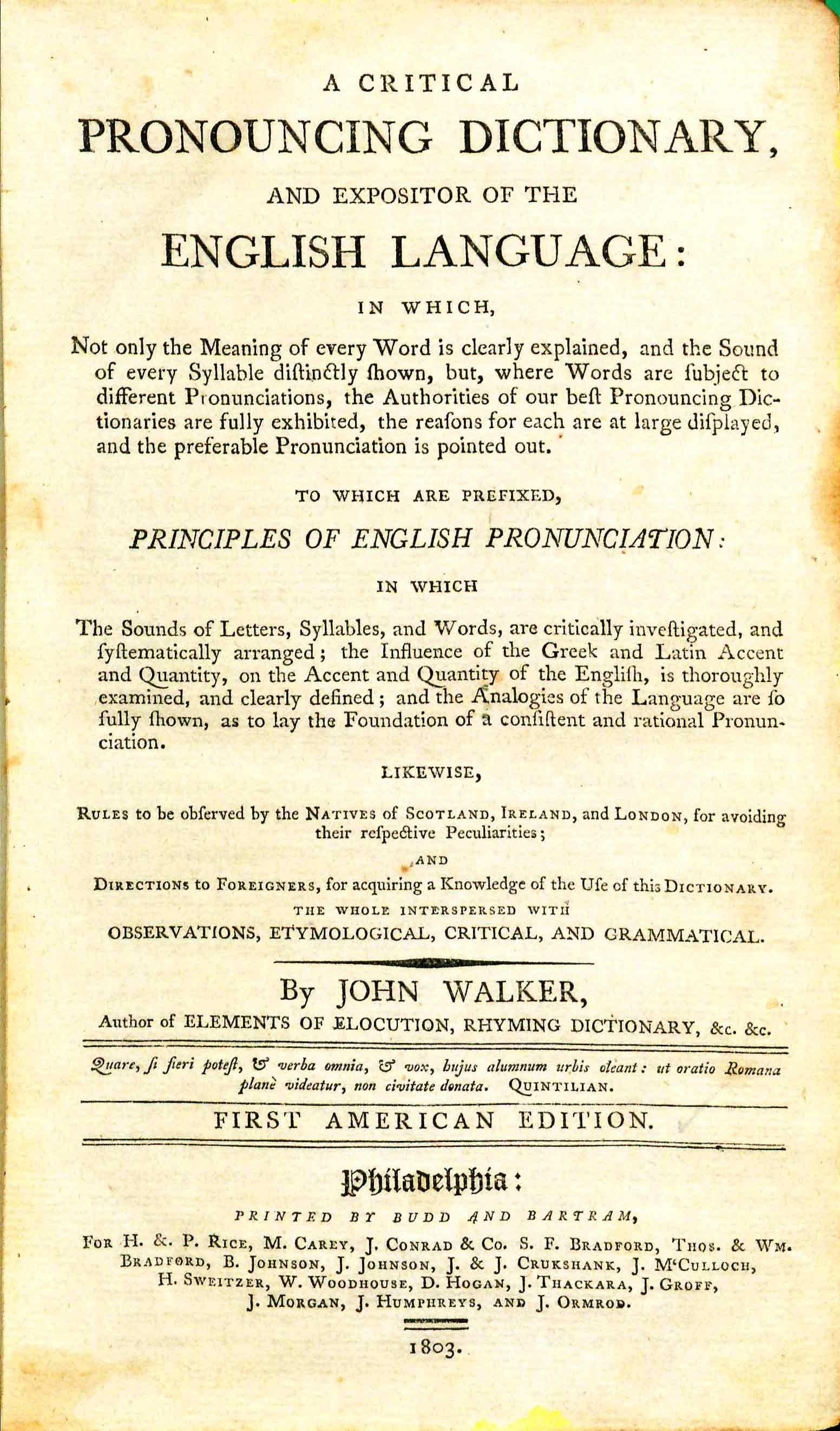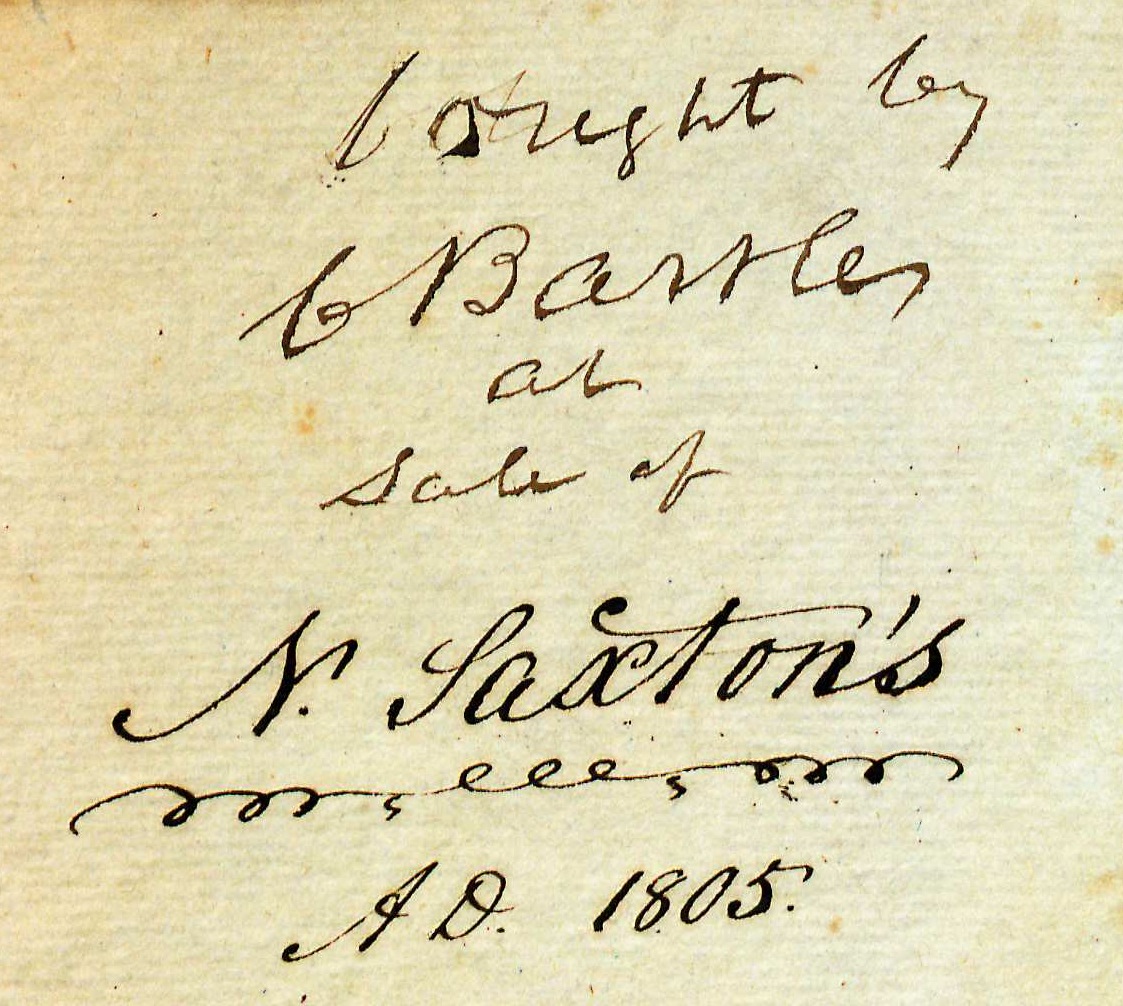A Critical Pronouncing Dictionary, and Expositor of the English Language
by John Walker
| A Critical Pronouncing Dictionary, and Expositor of the English Language | |
|
Title page from A Critical Pronouncing Dictionary, and Expositor of the English Language, George Wythe Collection, Wolf Law Library, College of William & Mary. | |
| Author | John Walker |
| Published | Philadelphia: Printed by Budd and Bartram for H. & P. Rice |
| Date | 1803 |
| Edition | First American |
| Language | English |
| Pages | cxxxi, [1], [990] |
| Desc. | 8vo (22 cm.) |
| Location | Shelf L-4 |
A Critical Pronouncing Dictionary, and Expositor of the English Language is dictionary authored by John Walker (1732 – 1807), a British elocutionist and lexicographer. Born in 1732, Walker worked as an actor with various theater companies in England and Ireland before leaving acting in 1768.[1] After opening a school in Kensington in 1769, Walker began teaching elocution to young men who were studying for the bar.[2] A leader in the mechanical school of elocution, Walker taught his pupils detailed rules about voice production and developed a theory of voice inflection to explain how a voice's pitch can go up or down within a single syllable.[3]
Walker published several works, including Exercises for Improvement in Elocution in 1777 and The Melody of Speaking in 1787.[4] Walker's most influential work was his Critical Pronouncing Dictionary, which was originally published in 1791 in Britain and in the United States for the first time in 1803.[5] In his Critical Pronouncing Dictionary, which has been reprinted over 100 times since its publication, Walker sets out 545 rules for the correct pronunciation of words in the English language, including rules for people with Irish or Scottish accents to follow in order to produce more “cultured” accents.[6] Walker’s work became one of the foremost authorities on English linguistics, and his system of using marks and numbers to indicate stressed syllables has remained influential in modern linguistics.[7]
Evidence for Inclusion in Wythe's Library
Listed in the Jefferson Inventory of Wythe's Library as "Walker's dictionary. 8vo." This was one of the titles kept by Thomas Jefferson and later sold to the Library of Congress in 1815. Both George Wythe's Library[8] on LibraryThing and the Brown Bibliography[9] list the first American edition published in Philadelphia in 1803. This is also the edition Millicent Sowerby's included in Catalogue of the Library of Thomas Jefferson,[10] however, Jefferson's copy no longer exists. The Wolf Law Library chose to add the edition suggested by Sowerby, Brown, and LibraryThing.
Description of the Wolf Law Library's copy
Bound in full brown leather binding with gilt lettering on the spine. includes notes of previous ownership "bought by G Bassler at sale of N. Saxton's A.D. 1805" on front pastedown. "N. Saxton's, A.D. 1805" also on rear pastedown. Purchased from Black Swan Books.
Images of the library's copy of this book are available on Flickr. View the record for this book in William & Mary's online catalog.
Full text
See also
References
- ↑ Joan C. Beal, "Walker, John (1732–1807)" in Oxford Dictionary of National Biography, accessed October 20, 2013.
- ↑ Ibid.
- ↑ Ibid.
- ↑ Ibid.
- ↑ Ibid.
- ↑ "Learning English Timeline," British Library website, accessed October 15, 2013.
- ↑ Ibid.
- ↑ LibraryThing, s.v. "Member: George Wythe," accessed on November 19, 2013.
- ↑ Bennie Brown, "The Library of George Wythe of Williamsburg and Richmond," (unpublished manuscript, May, 2012) Microsoft Word file. Earlier edition available at: https://digitalarchive.wm.edu/handle/10288/13433.
- ↑ E. Millicent Sowerby, Catalogue of the Library of Thomas Jefferson, (Washington, D.C.: The Library of Congress, 1952-1959), 5:134-135 [no.4876].
External Links
Read this book in Google Books.

